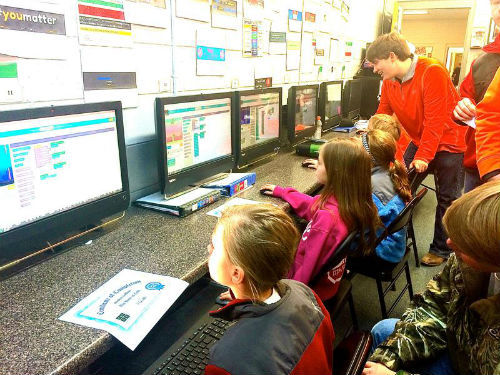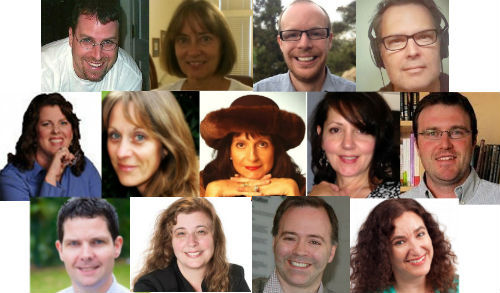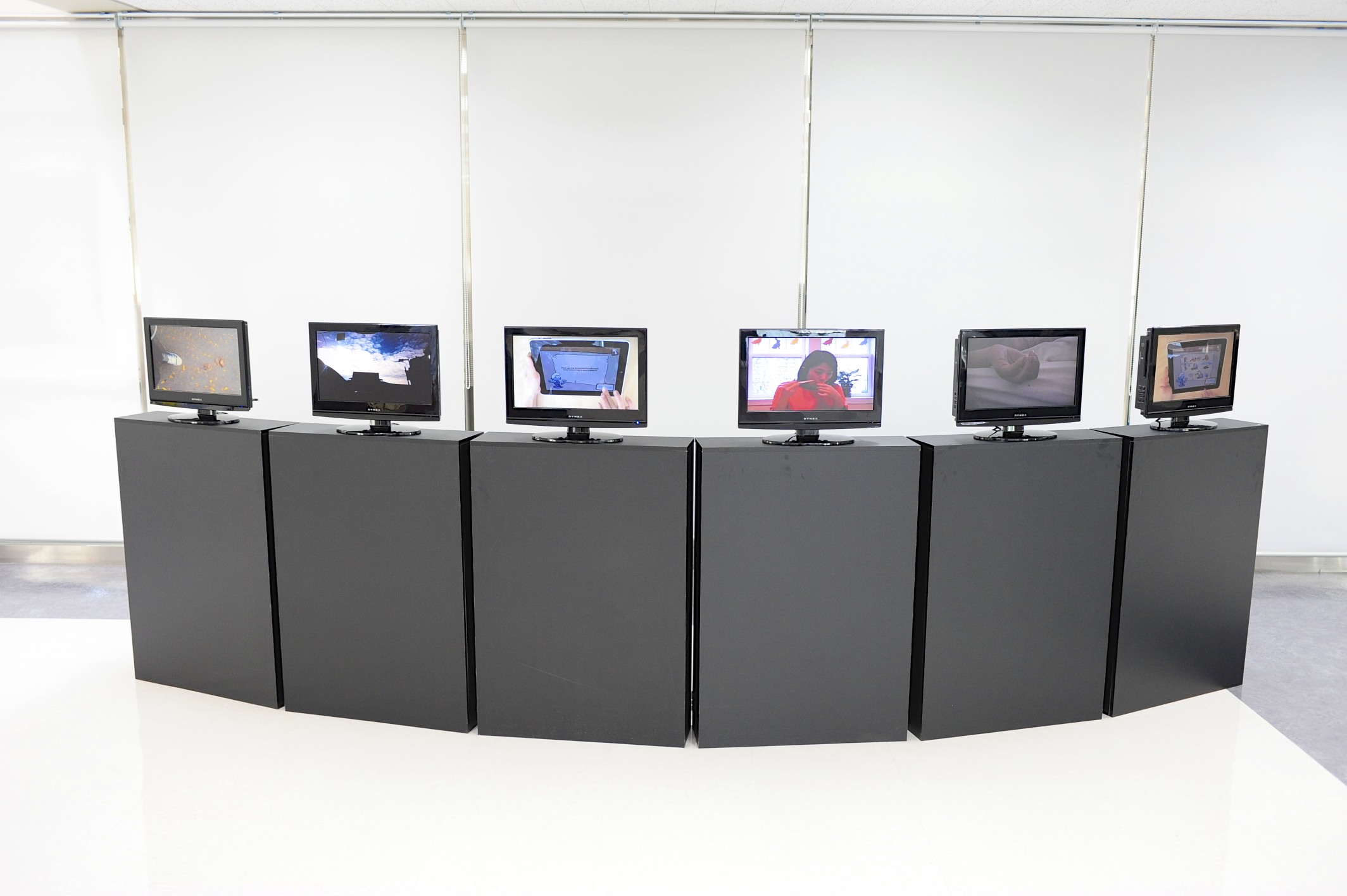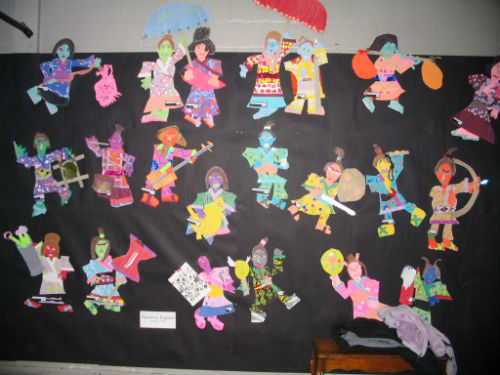
Joe Bower (joe_bower) from Canada points to a potential future mode of assessment. He has already swapped tests and grades in his classroom and replaced them with projects and performances collected in student portfolios. He still teaches for tests as much as he needs to but doesn’t let this overwhelm overall learning. More from Joe here.
Craig Kemp (mrkempnz) based in Singapore (which has a world-renowned education system, ranking 2nd on the PISA 2012 Lesen, Math and Science tests) says about testing that he has seen “the negative result of this pressure on students every day.” He talks about how the emphasis in his classroom is on learning through real world experience rather than on cramming for high stakes tests. Schließlich, this helps students to excel across the board, since it encourages them to love learning. More from Craig here.
Angela Watson (@Angela_Watson) (recommended by Vicki Davis – coolcatteacher) warns us that “no matter how others may choose to evaluate your work, you can’t define your own success as a teacher according to whether students pass a standardized test. That’s a recipe for frustration and burnout.” Angela recommends focusing on the tried and true goals of working to make a difference and igniting passion. More from Angela here.
Karyn McWhirter (recommended by Pauline Hawkins – PaulineDHawkins) notes that “if an assessment is not a quality thinking/communicating task, then giving it to students is a waste of time.” She has found that preparing students for AP tests is helping them to learn analysis, argumentation, and communication. The problem for her is not with testing at large but the types of exams and what they are testing for. More from Karyn here.
Todd Finley (finleyt) believes “high-stakes standardized tests (HSSTs) unterminieren wirksame Praxis, especially when we treat testing as content rather than just one of many ways of understanding what learners need.” Todd shares his “test prep tips” but recommends that teachers trust their teacher-researcher brains by experimenting “with different test-prep activities, Analyse der Ergebnisse, and making creative adjustments.” More from Todd here.
Luke Reynolds (recommended by Adam Steiner – @steineredtech) thinks students are “more than just test scores,” and hence focuses less on the test and more on overall classwork. He’s not sure if this is too idealistic, given the importance placed on testing elsewhere in the culture, but in the end, he expects that his students’ test scores won’t suffer. More from Luke here.
Richard Wells (iPadWells) based in New Zealand notes that the test prep playing field is out of whack, in favor of the middle class. This has to change, however it involves not just teachers and schools but also the government making changes – so we can move towards an environment of teamwork rather than competition. More from Richard here.
Chris Speck (recommended by Adam Steiner – @steineredtech) doesn’t have a magical answer. However he comments that “rather than teaching to the test, the most successful schools teach through the test.” Chris thinks that there are definitely ways to balance test prep with overall classroom needs. The key, , sagt er, is to emphasize critical thinking, even when doing test prep. More from Chris here.
Kelly Meehan (recommended by Adam Steiner – @steineredtech) notes that as early as preschool, high stakes testing has inundated the curriculum in schools. She thinks we should be asking ourselves these questions: “What is the quality of the teaching and learning happening inside our classrooms? Is it the type of teaching and learning that is exploratory, einnehmend, and thought provoking? A type of learning that rewards risk and “falsch” Antworten?” More from Kelly here.
Be sure to join us next month for another big picture question that our Top 12 Global teachers have the answer for.
Tom Bennett, Joe Bower, Susan Bowles, Lisa Currie, Vicki Davis, Todd Finley, Pauline Hawkins, Craig Kemp, Karen Lirenman, Adam Steiner, Silvia Tolisano, und Richard Wells sind Die globale Suche nach Bildung Top 12 Globale Lehrer Bloggers.

(Photo courtesy of Vicki Davis)
Begleiten Sie mich und weltweit renommierten Vordenkern wie Sir Michael Barber (Vereinigtes Königreich), DR. Michael Block (US-), DR. Leon Botstein (US-), Professor Ton Christensen (US-), DR. Linda Hammond-Liebling (US-), DR. MadhavChavan (Indien), Professor Michael Fullan (Kanada), Professor Howard Gardner (US-), Professor Andy Hargreaves (US-), Professor Yvonne Hellman (Niederlande), Professor Kristin Helstad (Norwegen), Jean Hendrickson (US-), Professor Rose Hipkins (Neuseeland), Professor Cornelia Hoogland (Kanada), Herr Jeff Johnson (Kanada), Frau. Chantal Kaufmann (Belgien), DR. EijaKauppinen (Finnland), Staatssekretär TapioKosunen (Finnland), Professor Dominique Lafontaine (Belgien), Professor Hugh Lauder (Vereinigtes Königreich), Herr Ken Macdonald (Vereinigtes Königreich), Professor Geoff Masters (Australien), Professor Barry McGaw (Australien), Shiv Nadar (Indien), Professor R. Natarajan (Indien), DR. PAK NG (Singapur), DR. Denise Papst (US), Sridhar Rajagopalan (Indien), DR. Diane Ravitch (US-), Richard Wilson Riley (US-), Sir Ken Robinson (Vereinigtes Königreich), Professor Pasi Sahlberg (Finnland), Professor Manabu Sato (Japan), Andreas Schleicher (PISA, OECD), DR. Anthony Seldon (Vereinigtes Königreich), DR. David Shaffer (US-), DR. Kirsten Sivesind (Norwegen), Kanzler Stephen Spahn (US-), Yves Theze (LyceeFrancais US-), Professor Charles Ungerleider (Kanada), Professor Tony Wagner (US-), Sir David Watson (Vereinigtes Königreich), Professor Dylan Wiliam (Vereinigtes Königreich), DR. Mark Wormald (Vereinigtes Königreich), Professor Theo Wubbels (Niederlande), Professor Michael Young (Vereinigtes Königreich), und Professor Zhang Minxuan (China) wie sie das große Bild Bildung Fragen, die alle Nationen heute konfrontiert erkunden.
Die Global Search for Education Community-Seite
C. M. Rubin ist der Autor von zwei weit Lese Online-Serie für den sie eine 2011 Upton Sinclair Auszeichnung, “Die globale Suche nach Bildung” und “Wie werden wir gelesen?” Sie ist auch der Autor von drei Bestseller-Bücher, Inklusive The Real Alice im Wunderland, ist der Herausgeber des CMRubinWorld, und ist ein Disruptor Foundation Fellow.
Folgen Sie C. M. Rubin auf Twitter: www.twitter.com/@cmrubinworld






Jüngste Kommentare